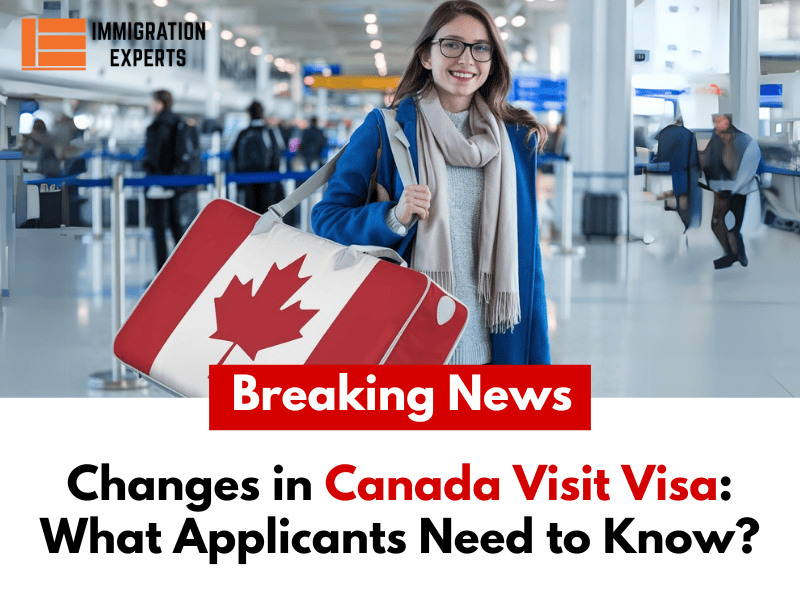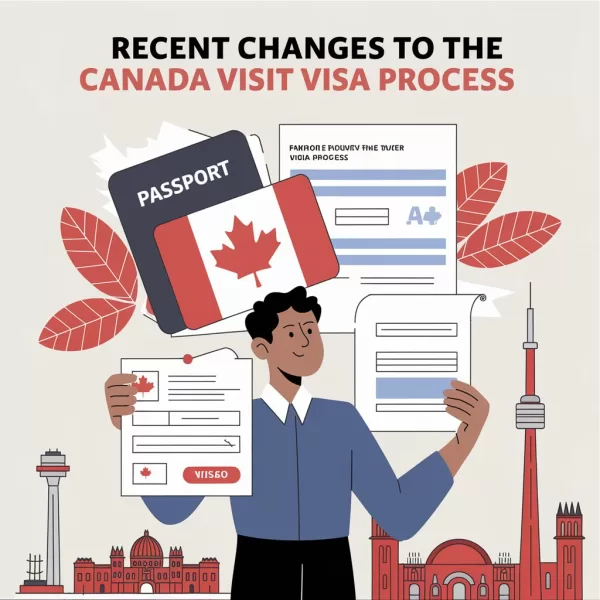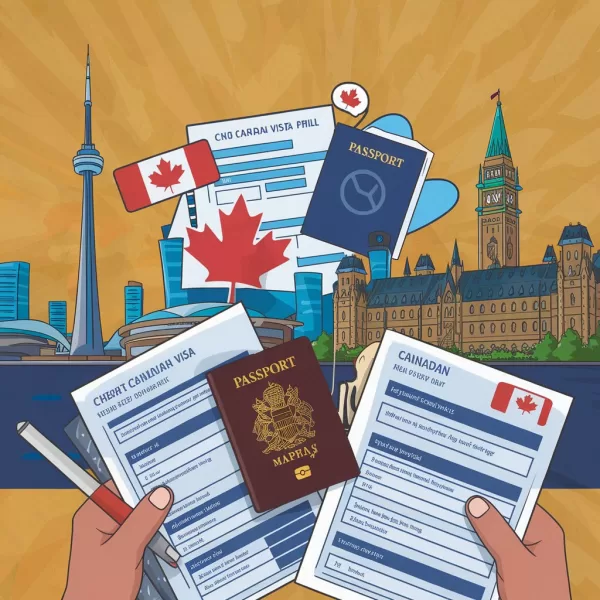051 8439995, 042 35911332

In an important change affecting many international travelers, Canada’s immigration department has updated its rules for issuing both single-entry and multiple-entry visit visas.
This revision gives immigration officers more flexibility, enabling them to carefully consider an applicant’s situation when deciding on the visa type and its duration.
The new guidelines mark a departure from the previous practice, where multiple-entry visas with the longest possible validity were often granted.
Under the updated process, officers will now take into account various factors such as the reason for the visit, financial situation, health conditions, and connections to the applicant’s home country before deciding on the visa type and how long it will be valid.
In this article, we’ll explain the details of the new rules and what applicants can expect when applying for a Canadian visitor visa.
Things You Will Find In This Page
Multiple-Entry vs. Single-Entry Visas: What’s the Difference?
With Canada’s updated guidelines, the choice between a single-entry or multiple-entry visa is no longer automatic.
Immigration officers are now instructed to assess each case on its own, taking into account various key factors before determining the most suitable visa type for the applicant.
Here’s a breakdown of each visa category:
1. Multiple-Entry Visa
- Overview: A multiple-entry visa allows the holder to enter Canada multiple times during the visa’s validity period, regardless of their location.
- Validity: These visas can be valid for up to 10 years or until the applicant’s passport expires, whichever happens first.
- Requirements: If the visa is attached to an expired passport, the holder can still use it by carrying both the expired and the current valid passport when entering Canada.
2. Single-Entry Visa
- Overview: A single-entry visa allows for only one entry into Canada. Once the holder leaves the country, they must apply for a new visa to re-enter.
- Common Use: These visas are typically issued for one-time purposes, such as attending a conference or event, where the applicant does not plan on re-entering Canada after leaving.
Officers have the discretion to issue either type of visa and will consider various factors to decide which one best meets the applicant’s needs.

Guidelines for Issuing Single or Multiple-Entry Visas
The updated policy stresses that immigration officers should evaluate an applicant’s profile to determine the appropriate visa type—single-entry or multiple-entry.
Here are the factors officers will consider in this decision-making process:
1. Purpose of Visit
- One-Time Event: If the applicant is traveling for a specific purpose, like a conference, training, or tourism, a single-entry visa may be more suitable.
- Frequent Visits: For applicants planning to visit Canada regularly (e.g., to visit close family), a multiple-entry visa is often the better choice.
- Special Circumstances: For compassionate visits, such as visiting a critically ill relative, the decision may depend on how often the applicant needs to visit and the specific circumstances.
2. Financial Stability
- Applicant’s Finances: Applicants with steady financial resources are more likely to be granted a multiple-entry visa, as they are better equipped to make multiple trips to Canada.
- Support from Host: If the applicant’s Canadian host will cover expenses, the host’s financial stability and the relationship between the two parties will be considered.
- Employer Sponsorship: For work-related trips funded by an employer, officers may request supporting documents, such as an employer’s letter, to verify financial support.
3. Medical Considerations
- Health Conditions: If an applicant has a medical condition that could worsen over time, officers may opt for a shorter visa validity or issue a single-entry visa.
- Medical Visits: For applicants seeking medical treatment in Canada, proof of health insurance or a plan to cover medical expenses may be required.
4. Additional Factors
- Ties to Home Country: Having strong ties to your home country, like stable employment or family obligations, can impact the decision to grant a multiple-entry visa.
- Travel History: Applicants with a history of international travel or who have adhered to Canadian visa conditions in the past are more likely to be approved for a multiple-entry visa.
- Previous Refusals: If the applicant has previously been denied a visa to Canada or other countries, this may impact the decision. In these situations, a single-entry visa might be granted instead.
Determining the Visa Validity Period
Although a multiple-entry visa can be valid for up to 10 years, this is no longer the default duration. Immigration officers are now instructed to assess each applicant’s situation individually and may grant visas with shorter validity periods based on various factors. The following aspects influence the validity period:
- Purpose of Visit Duration
If the applicant is visiting for a short-term purpose, such as business activities under a warranty agreement, the visa may be issued with a validity that matches the expected length of stay. - Country of Residence and Stability
The applicant’s status and stability in their home country will also be considered. If the political or economic situation in their country is unstable, a shorter validity period for the visa may be deemed more suitable. - Evolving Ties
Changes in the applicant’s ties to both Canada and their home country could influence the visa’s duration. If there are indications that these connections will weaken, the officer may issue a visa with a shorter validity period.
Implications of the New Visa Guidelines for Applicants
The updated visa guidelines bring a more tailored, individualized approach, which can have both positive and challenging effects on applicants.

Here’s what applicants can expect:
- Purpose of Visit Will Impact Visa Duration: Immigration officers will focus more closely on the purpose of the applicant’s visit, especially for one-time or compassionate travel, which could result in a shorter or more targeted validity period.
- Increased Scrutiny: With greater discretion comes a higher level of scrutiny. Applicants may be asked to provide additional proof to support their request for a multiple-entry visa, including financial documents, family ties, and justifications for frequent trips.
- Potential for Shorter Validity: Applicants for multiple-entry visas may find that they receive a visa with a shorter validity period than the previous 10-year norm, depending on the factors mentioned above.
- Personalized Assessment: Each application will be assessed individually, leading to decisions that better reflect the applicant’s specific circumstances and travel intentions. This could result in more customized visa outcomes.
Steps to Improve Your Canada Visitor Visa Application
To improve the chances of a positive outcome, applicants should consider the following tips:
- Provide Clear Documentation: Ensure you submit clear and detailed evidence of the purpose of your visit, your ties to your home country, and your financial ability to support your travel.
- Show Strong Ties to Your Home Country: Highlight connections such as family, employment, and property in your home country to reassure immigration officers that you intend to return after your visit.
- Prepare Financial Proof: Whether funding the trip yourself, being supported by a host, or sponsored by an employer, provide complete and up-to-date financial documents to demonstrate your ability to cover expenses during your stay.
- Health Insurance: If you’re visiting for medical reasons, ensure your health insurance covers the entire duration of your stay and provide the necessary documentation to support this.
Canada’s updated visitor visa guidelines emphasize the importance of a personalized assessment. With officers now having more discretion in issuing single- or multiple-entry visas and deciding their validity period, applicants must be prepared to meet specific criteria and submit thorough documentation.
Whether you’re traveling for family visits, business, or medical purposes, understanding these new guidelines and being fully prepared can significantly improve your chances of a successful application.
This updated approach reflects Canada’s efforts to strike a balance between welcoming international visitors and ensuring that entries into the country are secure and well-justified.
Canada Visit Visa Processing Times
The processing time for a Canada visit visa can vary depending on the applicant’s country of residence. Below are the latest average processing times for finalized applications from some nations:
- India: 113 days
- United States: 26 days
- Nigeria: 175 days
- Pakistan: 29 days
- Philippines: 18 days
Canada Visit Visa Duration
The duration of a Canadian visit visa is no longer standardized at 10 years or until the expiry of the passport. Instead, the validity period is determined by the immigration department based on the applicant’s circumstances and purpose of visit.
The duration of the visa is indicated on the visa sticker placed in the applicant’s passport once it is approved.
Also Read:
Canadian Visit Visa
